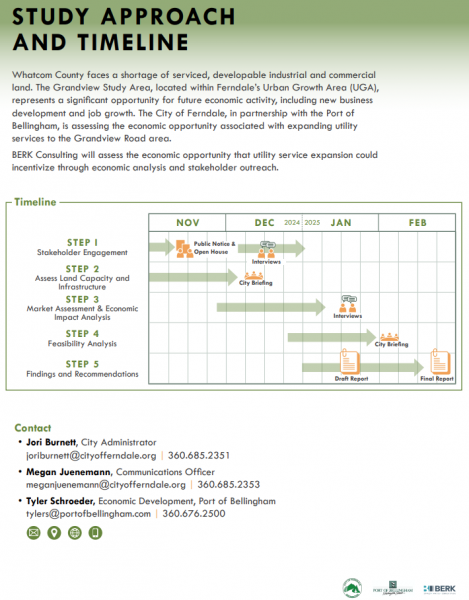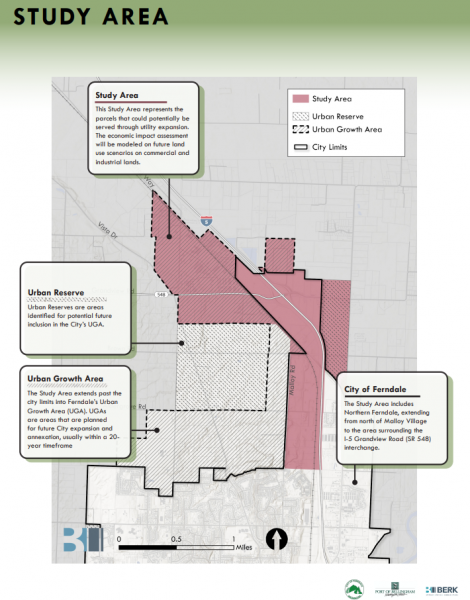Grandview Economic Opportunity Study
The City of Ferndale, in partnership with the Port of Bellingham, is conducting a study to assess the economic benefits to utility ratepayers for funding utility improvements in the Grandview Area. The goal of the City of Ferndale and the Port of Bellingham is to encourage development that will bring the greatest economic benefits to Ferndale and Whatcom County.
The study will inform the City and County’s long-range vision for the area and decisions about when and where to expand utilities. Utility infrastructure is generally supported by new development in Washington state. In this case, the city as the utility owner, could fund an expansion if it is in the best interest of utility ratepayers, which would be reimbursed through connection fees and other means. If this study demonstrates economic benefits, such as business development and job growth, grants and other funding may be available.
State law dictates how cities manage growth. Ferndale is expected to grow by approximately 11,000 people and add nearly 3,500 jobs between 2025 and 2045. The Grandview Study Area is in Ferndale’s urban growth area (UGA). Over the last ten years, the City has managed growth through infill development. Eventually, future growth will lead the City to annex more of its urban growth
areas, including the parts of the Grandview Study Area that are currently outside of the city limits.
Click here for more information, including:
- the Study’s objective and purpose,
- Grandview history,
- an overview of the study area, and
- the Study’s approach and timeline.
Engagement
- On Tuesday, November 12, 2024, the City of Ferndale and Port of Bellingham cohosted an Open House to introduce the Grandview Economic Opportunity Study. The Open House provided information about the Study’s scope and objectives, while initiating discussions and answering questions to current Grandview property owners. Click here to view presentation materials from the Open House.
- BERK Consulting began contacting property owners and stakeholders in Fall of 2024 for more in depth interviews and discussions.
- BERK Consulting will be presenting at the January 6th, 2025 Ferndale City Council Meeting. The public is invited to attend. City Council Meetings take place at the City Annex (5694 Second Avenue) and start at 5:00 p.m.

FAQ
Why is the City doing this project now?
The Grandview area has long been part of the City of Ferndale’s future growth plan: The City’s Comprehensive Plan notes that the extension of utilities, including sewer, to the Grandview area is necessary for major development in the area to occur. (Land Use Element, 2016 Comprehensive Plan, Page 43).
The City’s Comprehensive Sewer Plan anticipates the extension of sewer to the Grandview Areas (East and West) and includes a 2011 Feasibility Study. A subsequent feasibility study was completed in 2017, and both studies will be re-examined as part of the current Economic Opportunity Study this analysis, and the later engineering design work for the extension. The City’s Utility Rate Analysis (2019, revised 2023) includes consideration of the Grandview Sewer Extension into utility user connection fees and monthly bills.
Areas in unincorporated Whatcom County do not benefit from comprehensive long-range planning the same way as property in city limits. As a result, property owners within the Grandview area have been permitted by Whatcom County to develop their properties without appropriate urban infrastructure, which will limit the area’s future economic potential. Growth in Whatcom County over the last two decades has resulted in very limited commercial and industrial lands available to support future business and job growth. The City of Ferndale and the Port of Bellingham are conducting the Economic Opportunity Study now to identify opportunities to optimize the economic and job benefits of future development in Grandview for the benefit of current county residents and business.
Much, if not a majority, of the project will utilize public funds. While the City cannot make a profit from a sewer extension project, it is important for the City Council and any other public funding agency to consider the economic impact of their investment. The City and other agencies may determine that it is appropriate to fund the project even if there is little direct monetary return on investment, but this does not mean that these agencies should not seek to quantify what that return could reasonably look like, and what the overall costs to prepare the area for future development are. Failure to make these assessments in advance risks an incomplete understanding of the project.
How will the sewer extension be funded?
The Grandview Economic Opportunity Study is assessing the feasibility of sewer expansion based on the estimated economic impacts from future development. If the City decides to pursue the sewer expansion, it will commission an updated sewer design and cost estimate study.
However, based on a 2017 study, the total cost of the project is estimated to be between $15 million and $20 million, with annual construction cost inflation averaging 5-7% each year. The City anticipates funding the expansion through City sewer reserved funds and will be seeking grants and public benefit loans to help finance the cost of the expansion. Property owners and development benefiting from the extension will also be required to pay their portion of the utility service, as required by law. Costs to property owners may be structured through connection fees and other cost-sharing mechanisms such as a Latecomer’s Agreement, Utility Local Improvement District (ULID) structure, or other approach that is typical of infrastructure expansions of this type.
Is the City committed to a specific alignment or route for a future sewer extension?
No. The sewer expansion has not yet been designed. However, previous engineering assessments recommend an alignment within existing public right of way (Malloy Drive, Portal Way) will eliminate the need for property acquisition and related costs, while retaining the public’s ability to utilize and maintain the alignment in perpetuity. Further, an extension along the west side of Interstate Five (along Malloy Drive) will enable future residential growth within the City’s Urban Growth Area (UGA) to the west of Malloy to connect to the sewer utility via a gravity feed (i.e., without the need for additional pump stations).
The City recognizes that some may have preferences for alternative alignments. The final sewer deign decisions will be based on not only the cost to build the project, but the maintenance costs, the alignment with the City’s long range planning goals and policies, the maximizing the public benefit, and environmental and other legal considerations, among others.
What businesses does the City wish to attract to the Grandview Area? (where the response can be both a discussion of highest and best use, and a reminder that the City does not target specific businesses)
The City does not participate in the recruitment of specific businesses. In this case, the City and the Port of Bellingham seek to understand and define the “highest and best” commercial or industrial uses that could be expected to develop on this site and to further understand the infrastructure (utilities, power demands, transportation needs, etc.) that these types of use might require. The City may consider modifications to its land use and development requirements if it is in the best interest of the City of Ferndale.
Will residents/businesses in the area be required to connect (what conditions are required for connection)?
No. Connection to city services is typically a condition of development initiated by the property owner or the result of a failing septic system. Properties, especially residential properties that are not proposing development and do not have a failing septic, will be given the opportunity to connect but will not be compelled to connect.
Independent of the sewer extension, future annexations of lands in the City’s urban growth areas into the city limits may impact a property’s requirements to connect to city services. Properties within the city limits are required to connect to city services to provide basic predictability to the utilities and better service to ratepayers. It is important to note that the annexation process is separate from the land use development and permitting process. It is focused on changes to the City’s boundaries, rather than changes to the land use within those boundaries.
If the City decides to expand the sewer will my taxes go up?
It is unlikely that taxes will go up as a direct result of a sewer extension. Sewer extensions are generally funded by the City’s sewer fund, which receives revenue directly from ratepayers (bi-monthly billing fees, utility connection charges), rather than through taxation (property taxes, sales tax, etc.).
Other infrastructure improvements, such as road improvements, may impact property taxes where they use special assessments to properties benefiting from those investments.
If the City decides to expand the sewer, when will construction begin?
If the City decides to pursue the sewer expansion, it will commission an engineering design and cost estimate in 2026. The earliest construction could begin is 2027, assuming all permits and funding are in place at that time.
Will the interchange be addressed?
The Grandview Economic Opportunity Study will consult with the Washington State Department of Transportation (WSDOT) to assess freeway interchange capacity at the Grandview Exit (Exit 266) relative to the potential transportation demands of the uses that are projected in the area. If the Study identifies needed modifications to the interchange, an additional analysis culminating in an Interchange Justification Report (IJR) and coordinated with the Federal Highway Administration (FHWA) will be required prior to the construction of improvements.
How does the City anticipate serving both the east and west sides of the freeway?
The sewer extension will be required to cross Interstate Five. The City expects that any alignment could be completed in one or more phases depending on the cost and funds available, as well as other factors. As more land within the city limits and Urban Growth Area exist west of Interstate Five, including the Malloy area, the City expects that the western alignment will be prioritized.
Why does the City wish to expand to this area?
The Washington State Growth Management Act (GMA) requires that cities, including Ferndale, plan for future growth within a designated Urban Growth Area (UGA). In Ferndale, the UGA includes the Grandview area as well as land west of Malloy. State laws significantly limit the type and density of development that may occur without sewer.
This area has long been part of the City of Ferndale’s future growth plan, which is why Whatcom County has permitted the density and types of development in the Grandview area. In addition, much of the area has already been annexed to the City (Malloy, 1994, Grandview interchange, 2011), the City has an obligation to extend urban services for further development to occur.
Per the Washington State Growth Management Act (GMA) the City is required to plan for at least twenty years of projected growth. The City has recently completed a new wastewater treatment plant (sewer) and is in the process of completing an expanded water treatment plant and second deep aquifer well. The City retains sufficient water rights to support future growth, and is the only rights holder within the deep water aquifer.
How will the City prevent negative impacts of sewer expansion on environmentally sensitive areas?
As the design of the potential sewer extension has not yet been completed, specific environmental impacts have not yet been identified. There are several known wetlands and creeks along the Malloy Road corridor. The lineal nature of a sewer extension makes it more difficult to avoid these environmental features. This means that the likely most effective method of avoiding impacts will be by extending the sewer line within the public right of way, which has already impacted wetlands and creeks, and where mitigation measures may be less costly.
Why is the City considering expansions when it has not addressed other issues like pot holes, transportation projects, and school capacity?
The City is required by state law to maintain a schedule of infrastructure maintenance and repair as well as a capital improvement plan (expansions) designed to support projected growth. The infrastructure maintenance and repair schedule is based on a balance of demand and costs to the taxpayer.
School capacity is managed by the Ferndale School District with support from the City to evaluate growth projections and the impact of development on school demand. Overall school district capacity is sufficient to support anticipated growth.
Is the City considering extending water services to the Grandview Area as well?
Much of the Grandview area receives water from Whatcom County Public Utility District (PUD) #1. The Economic Opportunity Study will assess if there are development constraints related to water service.
If my property is outside city limits, will I be able to connect to the sewer?
No. State law prevents the city utilities from providing services outside of city limits in order to prevent urban sprawl and to protect agriculture and resource lands. State law allows for some rare exceptions, such as extending services to an unincorporated area for a key public service like a fire station.

